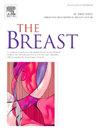Body mass index and progesterone receptor in postmenopausal ER-positive/HER2-negative breast cancer: A nation-wide study in Korean breast cancer society and the multi-institutional cohort
IF 7.9
2区 医学
Q1 OBSTETRICS & GYNECOLOGY
引用次数: 0
Abstract
Background
Obesity is a risk factor for breast cancer and associated with increased estrogen levels that stimulate the progesterone receptor (PgR). Understanding interplay between obesity, PgR, and prognosis in estrogen receptor (ER)-positive/human epidermal growth factor receptor 2 (HER2)-negative breast cancer (ER+/HER2-) is crucial. This study aimed to investigate the association between body mass index (BMI) and the prognostic value of PgR.
Methods
Study included 10,125 postmenopausal patients with ER+/HER2-breast cancer between January 1991 to December 2019. Patients were categorized according to BMI (cutoff: 25 kg/m2) and PgR (positive/negative). The primary outcomes were the 6-year overall survival (OS) in the Korean Breast Cancer Registry (KBCR) cohort and 6-year recurrence-free survival (RFS) in the multi-institutional cohort.
Results
In both cohorts, a greater proportion of patients with high BMI were PgR-positive, and the mean BMI was higher in the PgR-positive group. PgR-negativity was associated with worse 6-year OS in the KBCR cohort among patients with BMI ≥25 kg/m2 (hazard ratio [HR], 1.45; 95 % confidence intervals [CI], 1.06–1.97; P = .02), but not in those with BMI <25 kg/m2. Similarly, in the multi-institutional cohort, PgR-negativity was associated with worse 6-year RFS only in patients with BMI ≥25 kg/m2 (HR, 2.93; 95 % CI, 1.29–6.69; P = .01). The mean 21-gene recurrence score was higher in the PgR-negative group, regardless of the BMI.
Conclusions
In postmenopausal patients with ER+/HER2-breast cancer, the prognostic impact of PgR is modified by BMI. PgR-negativity is a strong predictor of poor outcomes in obese patients but not in non-obese patients.
绝经后er阳性/ her2阴性乳腺癌的体重指数和孕激素受体:韩国乳腺癌协会和多机构队列的全国性研究
背景:肥胖是乳腺癌的一个危险因素,与刺激孕激素受体(PgR)的雌激素水平升高有关。了解雌激素受体(ER)阳性/人表皮生长因子受体2 (HER2)阴性乳腺癌(ER+/HER2-)中肥胖、PgR和预后之间的相互作用至关重要。本研究旨在探讨体重指数(BMI)与PgR预后价值的关系。方法纳入1991年1月至2019年12月期间10,125例绝经后ER+/ her2乳腺癌患者。根据BMI(临界值:25kg /m2)和PgR(阳性/阴性)对患者进行分类。主要结果是韩国乳腺癌登记(KBCR)队列的6年总生存期(OS)和多机构队列的6年无复发生存期(RFS)。结果在两个队列中,高BMI患者中pgr阳性的比例更大,且pgr阳性组的平均BMI更高。在BMI≥25 kg/m2的KBCR患者中,pgr阴性与较差的6年OS相关(风险比[HR], 1.45;95%置信区间[CI], 1.06-1.97;P = .02),而BMI≥25 kg/m2的患者则无明显差异。同样,在多机构队列中,pgr阴性仅在BMI≥25 kg/m2的患者中与较差的6年RFS相关(HR, 2.93;95% ci, 1.29-6.69;p = 0.01)。无论BMI如何,pcr阴性组的平均21基因复发评分更高。结论在绝经后ER+/ her2乳腺癌患者中,PgR对预后的影响受BMI的影响。pgr阴性是肥胖患者预后不良的有力预测因子,而非肥胖患者则不然。
本文章由计算机程序翻译,如有差异,请以英文原文为准。
求助全文
约1分钟内获得全文
求助全文
来源期刊

Breast
医学-妇产科学
CiteScore
8.70
自引率
2.60%
发文量
165
审稿时长
59 days
期刊介绍:
The Breast is an international, multidisciplinary journal for researchers and clinicians, which focuses on translational and clinical research for the advancement of breast cancer prevention, diagnosis and treatment of all stages.
 求助内容:
求助内容: 应助结果提醒方式:
应助结果提醒方式:


